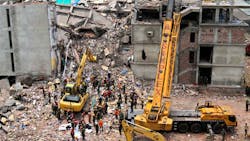Unrest Erupts in Bangladesh's Troubled Garment Hub
DHAKA - Bangladeshi police fired rubber bullets and tear gas at thousands of garment workers Monday as they demanded a wage hike at a protest in a manufacturing hub outside the capital Dhaka.
Police said they reacted after workers blocked a key highway in the Ashulia industrial area, home to hundreds of factories which make clothing for Western retailers such as Walmart.
Factories in the hub only reopened last week following unrest sparked by the country's worst industrial tragedy, which killed more than 1,100 people.
"They were demanding higher wages. We fired rubber bullets and tear gas to disperse them after they became violent and occupied a road," Ashulia police chief Badrul Alam said, saying that some of the protesters had hurled stones at police and attacked vehicles.
Alam said about 20,000 workers took part in the protest, but the area head of industrial police, Mustafizur Rahman, put the number at around 12,000.
Ekattor television, a private channel, said 50 people were injured in clashes between the workers and police.
Plants at Ashulia reopened on Friday after two weeks of unrest following the collapse of a nine-story garment factory complex near Dhaka in which 1,127 people were killed.
Angry workers have been demanding the execution of the owner of the complex and a big rise in their basic monthly wage, which was fixed at $38 in November 2010, prompting Pope Francis to compare the pay to that of "slave labor.”
Unions want the basic monthly rate to be raised to around $100.
There has been virtually no work at hundreds of factories at Ashulia since the April 24 building collapse which highlighted appalling safety conditions in the sector.
Most of Bangladesh's top garment factories, which make clothing for a string of major retailers including Walmart, H&M, Tesco, Inditex and Carrefour, are based at Ashulia.
Manufacturers reopened their plants following assurances of adequate security from the government. They said dozens of their factories had been vandalized during the unrest which cost them about $150 million in losses.
The government last week set up a panel to raise the salaries of the three million garment workers and has approved changes in labor laws, making it easier for them to form unions.
Bangladesh is the world's second-biggest apparel maker after China and the $20 billion industry accounts for up to 80% of annual exports.
Copyright Agence France-Presse, 2013
About the Author
Agence France-Presse
Copyright Agence France-Presse, 2002-2025. AFP text, photos, graphics and logos shall not be reproduced, published, broadcast, rewritten for broadcast or publication or redistributed directly or indirectly in any medium. AFP shall not be held liable for any delays, inaccuracies, errors or omissions in any AFP content, or for any actions taken in consequence.
